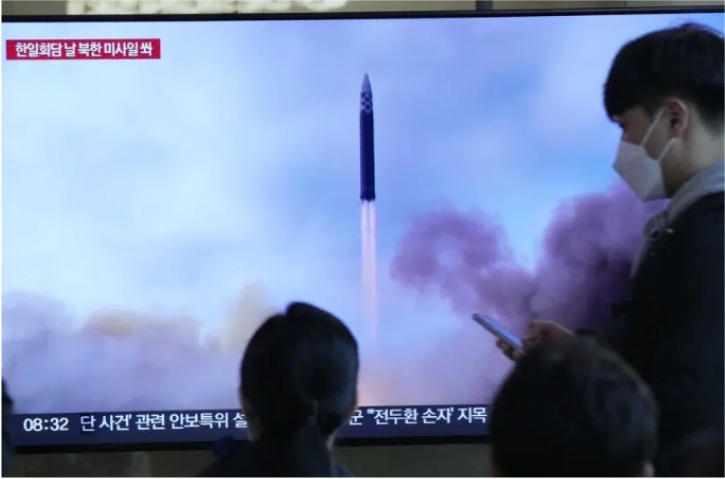
North Korea launched an intercontinental ballistic missile (ICBM) on Thursday, marking its third test in a week and the first ICBM test in a month. The missile flew approximately 1,000 km (620 miles) with a maximum altitude of 6,000 km (3,730 miles) for about 70 minutes before landing in the waters between the Korean Peninsula and Japan. The launch occurred just hours before South Korean President Yoon Suk Yeol and Japanese Prime Minister Fumio Kishida were scheduled to meet at a Tokyo summit to discuss the North Korean nuclear threat.
The international community is expressing concern over North Korea’s continued testing activities, as the country is already under international sanctions. US National Security Council spokesperson Adrienne Watson condemned the launch, saying, “This needlessly raises tensions and risks destabilizing the security situation in the region.” President Yoon Suk Yeol also warned that “North Korea’s reckless provocations will pay the clear price.”
North Korea has been rapidly increasing its missile capabilities in recent years, which has been a major point of contention in its ongoing negotiations with the United States and its allies. The country has repeatedly defied UN resolutions banning its nuclear and ballistic missile programs, and its recent testing activity has sparked renewed concern among international leaders.
The missile test comes amid ongoing joint military exercises between the US and South Korea. North Korea has long condemned these exercises as provocative and has used them as a pretext for its own military actions. In response to the latest missile test, South Korea’s military said it had “strengthened its surveillance and vigilance against possible additional launches.”
This latest missile test marks a significant escalation in North Korea’s testing activity, as it is the first time the country has tested an ICBM in over a month. ICBMs are capable of traveling long distances and are considered a major threat to national security. North Korea’s ability to develop and deploy ICBMs has been a major concern for the international community, as it could allow the country to strike targets far beyond the Korean Peninsula.
The missile test also comes as the Biden administration is conducting a review of its North Korea policy. The administration has expressed its willingness to engage in dialogue with North Korea, but it has also made clear that it will not lift sanctions until North Korea takes meaningful steps toward denuclearization.
In a recent interview, US Secretary of State Antony Blinken said that the administration is “looking at every aspect of our policy toward North Korea,” including the possibility of additional sanctions. Blinken also reiterated the US commitment to the denuclearization of the Korean Peninsula and said that the administration is “consulting closely with our allies and partners.”
The missile test is likely to complicate the Biden administration’s efforts to engage with North Korea. The administration has signaled its willingness to engage in dialogue with the country, but North Korea has shown little interest in returning to the negotiating table. The recent missile tests could be seen as a signal that North Korea is not interested in engaging in diplomacy at this time.
Despite the challenges, some experts believe that there may still be opportunities for dialogue between the US and North Korea. In a recent op-ed for the New York Times, former State Department official Daniel R. Russel argued that the Biden administration should “reach out to North Korea with a bold and flexible offer that puts denuclearization on the table, but also offers incentives and a path to a better future for the North Korean people.” Russel also called on the administration to engage with North Korea’s neighbors,
